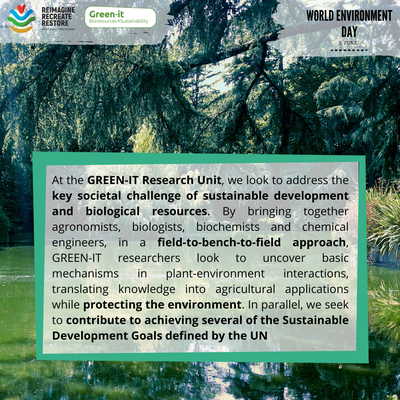World Environment Day 2021
Forces always act in pairs. An action will get a reaction. For years our society has acted upon nature in the pursuit for food and resources, without taking into consideration the reaction that was bound to get back to us. The myriad of natural ecosystems converted into human-designed and managed ones left a trail of degradation and abandonment worldwide. The exploitation of marketable provisioning services was often made beyond sustainable levels and at the expense of nonmarket regulating, cultural and supporting services. The effects are now clear – climate change, mass extinction, food and freshwater shortages.
With no time machine, we are forced to live with the costs of our past actions, but the consequences of today are still within our reach to change. The current state of degradation and its effect on biodiversity and climate have led to establish ambitious targets for ecosystem restoration at national and global levels. Restoring ecosystems carries substantial benefits for society, even beyond its ecological impact. It has an enormous potential to improve population health, socioeconomic well-being, and the integrity of diverse national and ethnic cultures.
The Aichi Biodiversity Targets, defined by the Convention on Biological Diversity and agreed upon by 196 countries, strongly advocate for ecosystems trough their strategic goals and targets. The Paris Climate Agreement also brings together 137 countries who have highlighted restoration in their plans. The 2030 Agenda for Sustainable Development, adopted by all United Nations Member States in 2015, has at its core 17 Sustainable Development Goals (SDGs). These represent an urgent call for action, as they recognize that ending poverty and other deprivations must go hand-in-hand with improved health and education, reduced inequality and economic growth, whilst tackling climate change and working to preserve oceans and forests.
 At the GREEN-IT Research Unit, we look to address the key societal challenge of sustainable development and biological resources. By bringing together agronomists, biologists, biochemists and chemical engineers, in a field-to-bench-to-field approach, GREEN-IT researchers look to uncover basic mechanisms in plant-environment interactions, translating knowledge into agricultural applications while protecting the environment. In parallel, we seek to contribute to achieving several of the Sustainable Development Goals defined by the UN, focusing mainly on Goal 2 “Zero Hunger”, Goal 15 “Life on Land”, Goal 13 “Climate Action”, Goal 12 “Responsible Consumption and Production”, Goal 4 “Quality Education” and Goal 17 “Partnerships for the Goals”. GREEN-IT encompasses various scientific teams that cover plant development, soil microbiome, stress response and plant breeding, but also an infrastructural component that ensures technological/bioinformatics platforms, education and science dissemination, all collectively working towards these global goals.
At the GREEN-IT Research Unit, we look to address the key societal challenge of sustainable development and biological resources. By bringing together agronomists, biologists, biochemists and chemical engineers, in a field-to-bench-to-field approach, GREEN-IT researchers look to uncover basic mechanisms in plant-environment interactions, translating knowledge into agricultural applications while protecting the environment. In parallel, we seek to contribute to achieving several of the Sustainable Development Goals defined by the UN, focusing mainly on Goal 2 “Zero Hunger”, Goal 15 “Life on Land”, Goal 13 “Climate Action”, Goal 12 “Responsible Consumption and Production”, Goal 4 “Quality Education” and Goal 17 “Partnerships for the Goals”. GREEN-IT encompasses various scientific teams that cover plant development, soil microbiome, stress response and plant breeding, but also an infrastructural component that ensures technological/bioinformatics platforms, education and science dissemination, all collectively working towards these global goals.
World Environment Day 2021 calls for urgent action to revive our damaged ecosystems, with the theme “Ecosystem Restoration”. This World Environment Day will see the launch of the UN Decade on Ecosystem Restoration (2021-2030), in a global mission to revive billions of hectares, from forests to farmlands, from the top of the mountains to the depth of the sea. The timeline also overlaps with the UN Decade of Action to achieve the Sustainable Development Goals by 2030.


